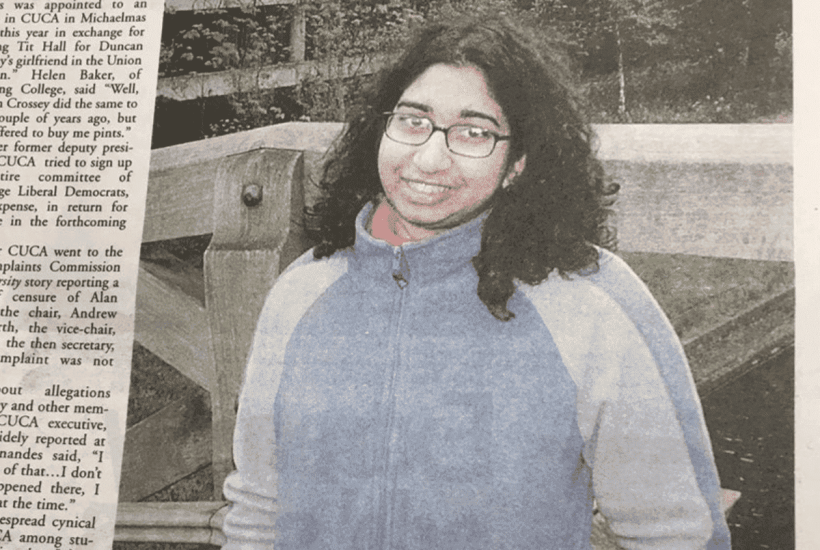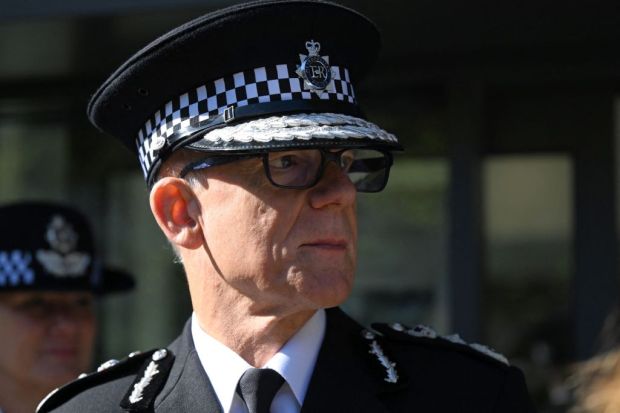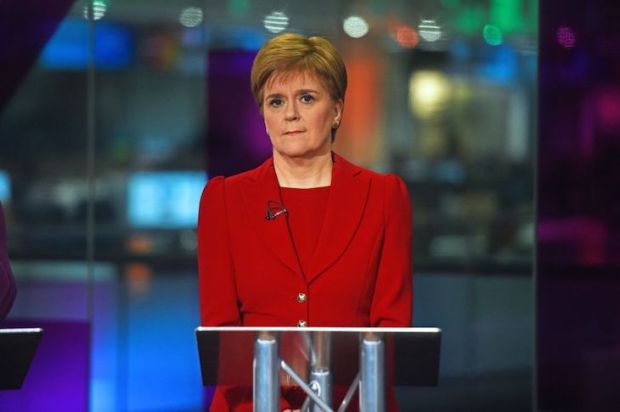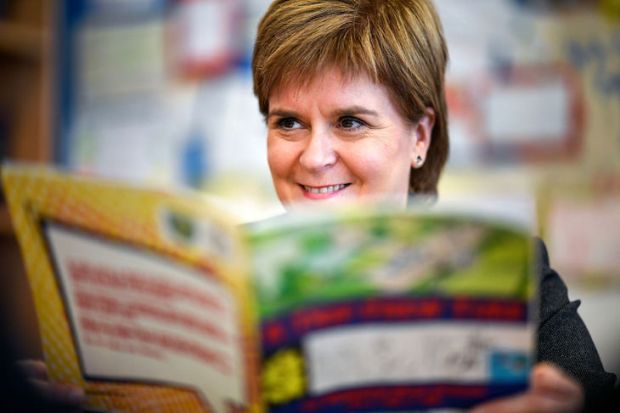Ah student politics: is there anything quite like it? The strange creatures it attracts, the passions it unleashes, the adolescent ambition and the glorious pettiness of it all; so vicious precisely because the stakes are so small. Such an ignoble tradition has spawned many of our lords and masters – Boris Johnson was an unabashed Union hack at Oxford while William Hague was ‘convicted of electoral malpractice’ in one election of the Oxford University Conservative Association (OUCA).
And having spent some time recently in the Cambridge University archives, Mr S is delighted to see the route from the common room to the Commons is still alive and well. For perusing copies of the Varsity student newspaper, Steerpike stumbled across an explosive story from May 2000, the front page splash no next. ‘Conservatives in corruption crisis’ the headline screamed, along with a prominent photo of a 20-year-old smiling student by the name of Suella Fernandes. Who was this aspiring lawyer? Why, none other than our current own Attorney-General, Suella Braverman.
Back then the government’s principal legal adviser had just been elected head of OUCA’s counterpart, CUCA. Her ascendancy to the chairmanship though was not without incident; for Varsity quotes an undergraduate as claiming Braverman tried to buy her vote, offering to ply him with pints and CUCA membership in the society’s election. The student hacks tried to front up the ‘clearly uncomfortable’ Braverman about such claims, with the awkward encounter beginning with her claiming the accusations were ‘completely untrue’ and ‘I’m not ready to disclose the internal affairs of CUCA’ followed by a ‘long silence’ ending with her asserting ‘you can’t prove anything.’


What a scoop! Unfortunately for the outlet in question, humiliation followed triumph just a week later when the next edition dropped. For a grovelling front-page retraction had to be printed by Varsity, with the student hacks forced to admit that labelling the allegations made against Braverman as ‘vote-rigging’ may ‘have implied a precise form of behaviour which we did not intend.’ Inside the paper, ample space was given over to a lengthy right of reply from Braverman, who pointed out the allegations of vote-rigging were ‘ludicrous’ as her election was uncontested and she faced no opponent.
She noted the (undisclosed) party political links of all those making allegations against her and fellow Tories. For four of those quoted were former representatives of the Liberal Democrat party – including future MP Julian Huppert who claimed ‘We all know CUCA is corrupt and inactive.’ Not very parliamentary language eh? No less than five letters rebutting the article appeared in the newspaper, including from Alan Mendoza, who now runs the Henry Jackson Society, with Braverman labelling such comments ‘innuendos’ and ‘false’. An early brush with libel law there for the future Attorney-General.
Braverman was of course not the only budding politician of her generation at Cambridge. Near-contemporaries would have included her onetime fellow Cabinet minister Robert Jenrick, who was Treasurer of CUCA the following year. At the age of 19, he already appeared a future master of the universe, being listed as ‘Mr Heseltine’ in a ‘Mr Men’ dating profile of the most eligible bachelors of Cambridge. Summing himself up as ‘driven, political, cultural,’ the scotch-drinking adolescent declared in ten years time he wanted to be ‘a millionaire businessman fighting my first seat in parliament.’ He managed it too, with a year to spare, contesting Newcastle-under-Lyme in 2010 before winning Newark four years later.


Described as the Conservative Association’s ‘political mastermind of everything’, the verdict of Varsity on the ex-Housing Secretary was: ‘Appears to be a gentleman and would treat you to a nice meal but you can’t help feeling there’s something hidden behind it all.’ Unsurprising, perhaps, given Jenrick named George Nathaniel Curzon – that ‘most superior person’ – as his political hero.
Elsewhere on the opposite side was aspiring socialist Richard Burgon, already displaying his sure political touch at such a tender age. Ahead of the 2001 election, the Labour Students chairman was featured in a Varsity splash – ‘MP Slates Uni Tories’ – ridiculing the notion that Tony Blair would levy top-up fees in the next parliament – which, err, of course he did just two years later. In a subsequent interview with the paper, Burgon – who’d contest his first public election a mere three years later – waxed lyrical on the dangers of career politicians, telling Varsity he was ‘suspicious of people who are so career-minded at our age… students who are involved in politics because they see it as a career’.

Asked whether he was one of those students at Cambridge ‘interested in getting power’ he replied ‘not in Westminster, my ideal job would be working in the trade unions, somewhere when you can look into the eyes of ordinary people’. Fine words – even if, within the decade, a 30 year-old Burgon was trying to follow his uncle into the Commons at the Barnsley Central by-election. And while he now portrays himself as a doughty defender of the Corbynite flame, it was all very different in the halcyon days of the early century. For the paper describes Burgon as agreeing that New Labour is indeed ‘red enough’ for him –’his only reproach is that they have not made enough of these achievements.’
So much for offering Blair a ‘re-education’ at his proposed ‘Tony Benn school.’ Indeed, Burgon was something of a budding-Blairite at the time, backing the Labour leader’s stance on the Euro and coming out with sound-bites aplenty such as ‘we should take the student out of student politics.’ He even criticised his peers for failing to such matters seriously as ‘slapping on a Che Guevara t-shirt for a demonstration and sloping off home when it’s not fun any more more is no replacement’ for serious activity.’ How ironic.

And they weren’t the only future politicians to grace the pages of Cambridge’s premier publication. For Prime Minister Boris Johnson was also a regular in the student newspaper at the turn of the century, thanks to his appearances on Have I Got News For You which earned him invitations galore to speak at the Cambridge Union. The then editor of The Spectator undertook several interviews with Varsity – including one quick-fire quiz which caught Mr Steerpike’s eye.
Pitted against Labour MP Sion Simon in the 26 April 2002 edition, Johnson answered a range of questions ranging from foreign affairs – criticising Israel’s Operation Defensive Shield – to the frivolous, declining to consider a penis enlargement. Already his policy on ‘cakeism’ – both pro-having it and pro-eating it – was clear, as can be evidenced by the simple answer ‘both’ to the question ‘NHS or lower taxes?’ Can’t say we weren’t warned…<//>
Got something to add? Join the discussion and comment below.
Get 10 issues for just $10
Subscribe to The Spectator Australia today for the next 10 magazine issues, plus full online access, for just $10.





















Comments
Don't miss out
Join the conversation with other Spectator Australia readers. Subscribe to leave a comment.
SUBSCRIBEAlready a subscriber? Log in